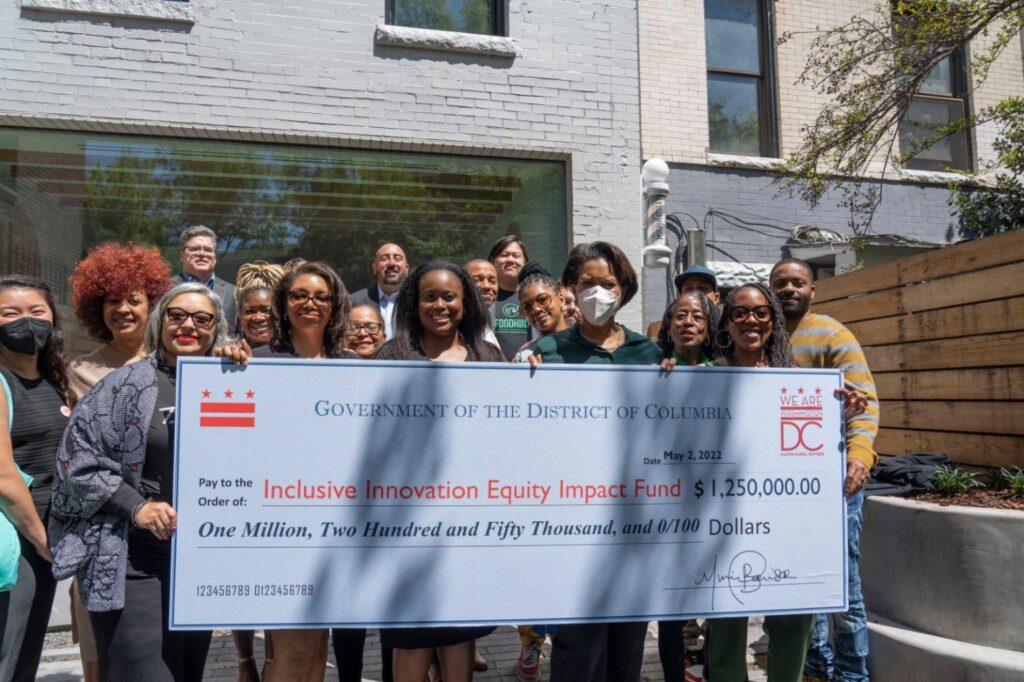The Inclusive Innovation Equity Impact Fund (IIEIF) will invest $1.25 million in 16 Washington, D.C. businesses owned by entrepreneurs who are economically disadvantaged or have experienced racial prejudice.
The fund, which was launched October 2021, is a combined effort between the D.C. government and 1863 Ventures, a business development nonprofit. Ventures was founded by Georgetown adjunct professor Melissa Bradley, who is a professor of practice at the McDonough School of Business (MSB). Small businesses qualified for the fund by being owned by a D.C. resident and being at least 51% owned by individuals who face hardship due to socioeconomic status or race. The goal of the fund is to address the gap in capital for businesses that do not receive early-stage funding through conventional financing.

All 16 businesses aided by the IIEIF, which range from luxury hair studios to dance institutes, will contribute to the vibrant economy and culture that strengthen the District. Selected enterprises will be rewarded with investments between $30,000 and $150,000.
Bradley said she was inspired to create the fund to help combat the systemic barriers people of color often face when seeking financial support for their business endeavors.
“The fund was created to address the fact that new majority entrepreneurs receive less than 1% of venture funding, and access to debt capital is limited as well due to slower decision times, higher interest rates and greater likelihood of denial for Black and Brown businesses,” Bradley wrote to The Hoya. “The IIEIF is designed to support growing businesses who lack access to capital to help fill the gap and support their revenue growth, job creation, and access to capital down the line.”
Despite Black residents representing 45% of the D.C. population, Black-owned businesses make up less than 14% of total businesses. Not only are there fewer Black entrepreneurs, but access to capital is more difficult for Black-owned businesses. The average annual revenue of Black-owned businesses is less than 15% of white-owned businesses.
According to Bradley, 1863 Ventures is helping to combat racial disparities in the District by prioritizing partnerships with historically marginalized entrepreneurs.
“We provide the necessary capital for local businesses to grow and scale to increase wealth creation in the District. We help businesses attract outside capital to increase the value of small business in D.C.,” Bradley wrote. “The access to capital fuels business growth which creates jobs in the region.”
Among the 2022 recipients of the fund is Mackenzie Loy (GRD ’22), a graduate of the MSB and the McCourt School of Public Policy and founder of Homemade in D.C. (HiDC).
HiDC, an online marketplace that connects consumers with female entrepreneurs and entrepreneurs of color in their area for catering and custom gift box services, sources its products entirely from women, BIPOC and LGBTQ+ individuals. The service also provides customers with a quarterly impact report on how the money they spent is helping local food entrepreneurs categorized by gender, ethnicity and ward.
According to Loy, the idea for HiDC emerged over the power food has to foster relationships.
“Food has always been incredibly important to me and my family — everything revolves around food,” Loy said in an interview with The Hoya. “I love food. I think food is so important; we all need to eat. It creates community.”
John Falcicchio, deputy mayor for planning and economic development in D.C., said the fund is an asset to bolstering opportunities for Black-owned businesses and, subsequently, for workers in the District.
“The Inclusive Innovation Equity Impact Fund has not only benefited local entrepreneurs but also District residents. New businesses like these make D.C. a unique destination to visit and to live,” Falcicchio wrote to The Hoya. “When it comes to culture, D.C. has a hospitality and tourism industry like no other city. That’s why we are the best place to start a business and grow a business over time.”
With the financial support she receives from the IIEIF, Loy said she is planning to pay off personal expenses and expand HiDC into other cities.
“Nobody talks about it, but you need to pay your own bills, right? And that funding has allowed me to do that,” Loy said. “And I want Homemade in D.C. to be a platform. I want there to be a Homemade in D.C., a Homemade in Baltimore, a Homemade in Kansas City. So, turning this into a scalable, repeatable platform that can also continue to hire local people.”
When HiDC first opened in January 2022, a food entrepreneur who was part of the marketplace informed Loy that a single catering order made through HiDC enabled her to pay her rent for the month and keep her business running, Loy said.
Loy said this moment reminded her about why she founded HiDC.
“She said we had kept her afloat, so that was a moment of like, ‘Yeah, that’s why I’m doing this,’” Loy said. “The food entrepreneurs are why I’ve started Homemade in D.C. The mission is to close the racial and gender wealth gap through food entrepreneurship.”




















